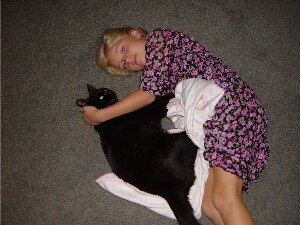Claws and effect: Cat killing shocks Bentivar

Her name was Carmen, but the family called her a "ragdoll" because she'd put up with anything. A big black cat, Carmen patiently allowed children to roughhouse with her, served as a frequent guest at a local elementary school's "show and tell" days, and followed neighbors around, rubbing up against their legs, purring and begging for a pat.
But one neighbor wasn't charmed by the three-year-old pet.
On a recent warm spring evening, Carmen was shot through the neck and injured so grievously that she was euthanized later that night. Her death has traumatized the two children who cared for her and galvanized their parents into action. Besides pitting one family against another in a posh northern Albemarle subdivision, the case illustrates some quirks of Virginia criminal law.
While Virginia has laws to punish people who harm animals, prosecutions rarely result in jail time, unless the attack leads to the animal's immediate death– or when the animal is livestock. Virginia appears to reserve its stronger punishments for those who kill farm animals.
"The laws need to start reflecting that pets aren't property," says Charlottesville Albemarle SPCA Executive Director Susann Kogut. "Pets are people's family members."
Kogut hopes judges will soon start handing out stiff sentences– especially in light of evidence that violence against animals has been closely correlated to violence against people.
Beloved pet
"She was a sweet cat,'" says Klaus Wintersteiger of Carmen, one of the two kittens he and and his wife, Vanessa, adopted from the SPCA three years ago. "She never scratched, never bit," he says, recalling his daughter dressing Carmen in doll's clothes and pushing her through the neighborhood in a carriage. Diagnosed with a heart murmur when she was a kitten, Carmen was not an active cat and preferred to be held or to lounge around in the yard, Wintersteiger says, especially in a wooded area at the western edge of the property, just feet from a neighbor's yard.
On the evening of April 24, Wintersteiger and Vanessa had gone out, leaving their two children home with Klaus' mother, Hannelore, who was visiting from Austria.
At about 7:30pm, Wintersteiger says, his mother was readying seven-year-old Isabella and nine-year-old Nicholas for bed when two gunshots rang out from the direction of the Wintersteiger's next-door neighbors, George and Kathy Seymour. Although firing a gun in a residential neighborhood is illegal in Albemarle County and is punishable by a fine of $25 to $1,000, Albemarle Police Lieutenant John Teixeira says it's a difficult charge to prosecute.
"An officer has to either see it or hear it in order to obtain a warrant," he says. Neither Wintersteiger's mother nor his children were fazed by the sound of gunfire, he says, because the family often heard shots coming from the Seymours' direction.
Soon after tucking the children into bed, however, Hannelore went downstairs and found Carmen, limp and bleeding, on the garage floor.
"I was in Waynesboro and I got a panicked phone call from my mom," recalls Wintersteiger. Hannelore told Wintersteiger she thought Carmen had been hit by a car. But when he arrived home an hour later and looked at the cat, he suspected something more sinister: "I said, this looks like a gunshot."
The law
Until recently, crimes against farm animals– horses, cows, and mules– were the most serious animal offenses under Virginia law. Those animals had significant financial value to their owners, and killing one was– and still is– a Class 5 felony, punishable by up to 10 years in jail. But cats and dogs are relegated to lesser status under statute 18.2-144, and killing one, because the law assumes they aren't worth much money, is a misdemeanor with a punishment capped at one year behind bars
A second section of the code– 3.1-796.122– deals specifically with cruelty to any animal, and in 2002, legislators amended the law so that a second offense of animal cruelty would be a class 6 felony. They also added a section to bolster penalties for crimes against "companion animals"– dogs and cats. The amended law states that any person who "tortures," "willfully inflicts inhumane injury or pain not connected with bona fide scientific or medical experimentation," or "cruelly and unnecessarily beats, maims, or mutilates any dog or cat that is a companion animal" can be charged with a class 6 felony. But there's a catch: the animal must die as a direct result of its injuries or because a vet recommends euthanasia.
Delegate Rob Bell says he's long been an advocate of strengthening Virginia's animal cruelty laws. In 2004, he proposed a law that would have made killing a dog or cat the legal equivalent of killiing a horse or mule. He notes that theft of property over $200 is a class 6 felony, and he ventures that "most pet owners would say their cat or dog is worth more than that to them."
His bill didn't pass, and he hasn't offered it since, he says, in part because of an infamous case in Staunton– one that bears similarities to what happened to Carmen.
Mosby was a dog known as a sort of mascot for the downtown Staunton community. In August 2003, Mosby's body was found wrapped in a bag by the side of a road, a bullet hole in his face.
Augusta County Commonwealth's Attorney A. Lee Ervin made a bold move– charging admitted shooter James C. Coleman with a felony for shooting a companion dog. Ervin won in a precedent-setting case, and although the 67-year-old Coleman received no jail time, Ervin was pleased with the outcome.
"I feel vindicated," he told the Staunton News-Leader at the time. "I took some heat for charging him with a felony."
Bell says he thinks lawmakers believed that felony conviction made his 2004 amendment unnecessary.
"They thought, 'Why fix something that isn't broken?'" Bell says. But if Carmen's shooting isn't treated as a felony because it wasn't legally considered "torture" or "inhumane injury," he says, it's possible his amendment should be reconsidered.
Dan Paden, a researcher in the domestic animals department of People for the Ethical Treatment of Animals, says Virginia animal cruelty law could stand to be strengthened.
"Our statute requires that the animal die," says Paden. "If you beat a dog within an inch of her life, and she pulls through, you're looking at a misdemeannor."
But, Paden adds, Virginia is one of only eight states that do give courts leeway to punish animal cruelty offenders in a different way. "The strength of Virginia's law lies in the fact that it allows courts to order convicted animal abusers, whether misdemeanor or felony, not to own animals for the rest of their life," Paden says. "I've seen it a half dozen times in past year alone."
One other thing that animal-abuse experts have seen is a correlation between violence against animals and violence against people. According to their 2003 book, Animal Cruelty: Pathway to Violence Against People, researchers Kathleen Heide and Linda Merz-Perez found that many of the approximately 100 inmates they studied at a maximum-security facility had instances of animal cruelty in their past. Such findings have energized the animal rights movement into calling for stronger prosecution of crimes against animals.
Of the 88 cruelty cases PETA has tracked in Virginia over the last seven years, only six were treated as felonies. The other 78 were class 1 misdemeanors, which carry a maximum of one year in jail and a $2,500 fine. In those cases, the perpetrators usually served no time, escaping with a suspended sentence or a small fine– essentially a slap on the wrist.
After what happened on the night of April 24, the Wintersteigers want to see that change.
April 24, 2006
Even under Virginia's revamped animal cruelty law, questions remain. For instance, what constitutes torture? What's an "inhumane" injury? And why must an animal actually succumb to its wounds in order for the perpetrator to be prosecuted for a felony? Did the bullet legally kill Carmen?
After getting the call from the children's grandmother, the Wintersteigers returned to find her cradling their bleeding pet. Carmen had apparently dragged herself home and collapsed on the concrete floor of the open garage.
Klaus and Vanessa left the sleeping children with their grandmother and took the cat to the Emergency Vet clinic on Greenbrier Drive, where, following X-rays, veterinarian Sara Salmon confirmed Wintersteiger's suspicion: Carmen had been shot, and the damage was extensive.
The bullet had created a nickel-sized wound as it entered the left side of the cat's neck and then traveled all the way through, leaving metal fragments in her flesh and shattering bones in her right shoulder and right leg before exiting, ripping a larger, ragged hole in the leg. The Wintersteigers were faced with a devastating decision. Alhough the vet said Carmen might survive with surgery– she would need to amputate Carmen's right leg up through the shoulder and fuse her ribs– there was no guarantee the cat, already weakened by her heart murmur, would survive. There was even less likelihood that she would recover enough to enjoy a normal life again.
She was in terrible pain, Wintersteiger says, and after considering both the questionable outcome and the expense of extensive surgery and treatment, which could reach several thousand dollars, the couple decided to euthanize their cat.
Wintersteiger says Salmon– who was out of the clinic the week before presstime and declined to comment without access to her records– was comforting about their decision, but had strong words for the couple as well.
"She insisted that we contact the police," he says. "We had been so focused on Carmen that we hadn't even thought about pressing charges." The next day, however, faced with the prospect of explaining to children Isabella and Nicholas that their cat was dead– and why– the Wintersteigers decided to follow Salmon's advice and pursue justice. Though they initially assumed the shooter might be an impulsive teenager, it wasn't long before all signs pointed to someone else, someone the Wintersteigers say they wouldn't have suspected.
These are the people in your neighborhood?
Located in the northern part of the County, off Route 29 via Polo Grounds Road, the Bentivar subdivision is a neighborhood of stately homes, manicured lawns, and multi-acre lots. Some properties are valued at well over a million dollars.
Wintersteiger says he went out of his way to get along with his neighbors, explaining how during the 1998 construction of their home, George and Kathy Seymour initially began constructing a forward-facing garage in violation of the subdivision's design rules.
When the Seymours were told they'd need to tear down and rebuild the structure, they circulated a petition through the neighborhood asking for a waiver, which Wintersteiger says he signed. "I figured it didn't really matter,'" he recalls.
Although the subdivision board eventually forced the Seymours to follow the rules and rebuild their garage with a side-facing entry, Wintersteiger says, "It wasn't because of me. I wanted to get along with them."
The same sentiment kept Wintersteiger from calling the police when, he says, he would see a couple of younger males leaving the Seymour driveway and "drag racing" down the winding street. Another neighbor, Kay Dannals, says she too has witnessed frequent instances of drag racing on the street. Following Carmen's shooting, Dannals now fears for the safety of her own seven cats.
Apart from offering the Seymours that early neighborly support and trying to overlook what he calls "inconsiderate" behavior, Wintersteiger says he never had a conversation with George Seymour. "I'd wave to him if we were out mowing the lawn," he says. "It was friendly."
Though the Wintersteigers' cats, Carmen and Oliver, were allowed to roam outside, Wintersteiger says he never heard a complaint from the Seymours about the cats or anything else. He believed his cats stayed away from the Seymours' property because that family owned a dog, who was often in a fenced pool area in their backyard.
Because they had no reason to suspect hostility on Seymour's part, and because Seymour is a middle-aged well-to-do businessman, Wintersteiger says he did not suspect that Seymour had shot Carmen. "If you're in your 50s," he says, "you shouldn't be doing things like that."
People are cruel
A quick perusal of the website www.pet-abuse.com is enough to make even callussed viewers recoil. A state-by-state listing of animal abuse cases reveals the grotesque extremes to which some people go when harming an animal– and the often light sentences they receive.
For instance, only one of the six animal cruelty felonies PETA has tracked in Virginia resulted in jail time for the accused. In that case, a Virginia Beach couple starved to death a dog they'd adopted from the pound, and were caught disposing of its body in a dumpster. The dog, which had weighed 25 pounds five months earlier, had wasted away to 11 pounds. At trial, the director of the Virginia Beach SPCA said the dog should have weighed 50 pounds.
Despite the on-going cruelty, 21-year-old John Pullen served just six months in jail, and Lakisha Pullen, 22, was sentenced to one month in the case because she was nine months pregnant at the time of the trial. More common are outcomes like the case of Leesburg resident Peter Landrith. In October 2004, he was convicted of stomping a 14-year-old cat to death in a trash can. While Landrith was sentenced to three years in jail and prohibited from owning any pets for the rest of his life, all the time was suspended.
But there is some sign that judges are taking a stricter approach to animal abuse cases.
On April 20, a judge in Virginia Beach sentenced Mickey McFayden to a full year and his sister, Molly McFayden, to one year in jail with six months suspended, for their role in the torture of a cat named Smokey.
According to news reports in Virginia Beach newspapers, the two– convicted of misdemeanor animal cruelty– shot the cat nearly a dozen times with a paintball gun, punched it, threw it against a wall, and put it inside a spinning clothes dryer. Both McFaydens were ordered to pay restitution to the Virginia Beach SPCA and cannot own pets for the rest of their lives.
A quick arrest
Police didn't have to look far before making an arrest in Carmen's shooting. Officer William C. Maiden, animal control officer for Albemarle County, quickly ended his investigation at the Seymours' house the day after the shooting. The suspect turned out not to be either of the Seymours' two grown sons. Instead, it was the businessman himself, George Seymour.
Since 2001, a former red brick Jefferson National Bank branch at the corner of Emmet Street and Hydraulic Road has been one of the city's more prominent auto dealerships. Located at what is arguably Charlottesville's busiest intersection, the Import Car Store offers dozens of used vehicles– including late model BMWs, Jaguars, and Mercedes– typically costing more than $10,000 and occasionally as much as $30,000 each. There's not a jalopy on the site. This is the business owned and operated by George Seymour.
Though officer Maiden declined comment, Wintersteiger says the officer told him he made the arrest after Seymour confessed to shooting Carmen "because he'd once seen her on his car."
Soon after the arrest, Nicholas confirmed that while looking through a downstairs window the night of Carmen's shooting, he had seen Seymour holding a "rifle-type gun" inside his fenced yard.
Wintersteiger says he hoped Seymour would be charged with a felony but was frustrated when he was charged only with a misdemeanor, particulary in light of the Staunton felony conviction in Mosby's death.
Commonwealth's Attorney Jim Camblos declines to divulge specifics of the Seymour case, which goes to trial June 20 in Albemarle District Court. And he refuses to explain why the charge against Seymour– who didn't return the Hook's calls for comment– isn't more serious.
However, Camblos, himself an owner of two dogs and two cats, says he doesn't look kindly on animal abusers, and he offers as evidence several past cases his office has prosecuted– including the shooting of the police dog Ingo.
"We put the guy who shot Ingo in jail, we convicted the guy who was fighting the pit bulls in White Hall," says Camblos, "and I'm going to go after this guy."
Picking up the pieces
A small pile of stones at the back of their wooded five-acre property marks the spot where the Wintersteigers buried Carmen. The days following her shooting have been difficult for Nicholas and Isabella. "They were devastated," Wintersteiger says. "My daughter went from totally crying to really organized, planning the funeral. My son wanted to go over there and hurt [Seymour]."
Nine-year-old Nicholas says he's still angry at the allegedly gun-wielding auto dealer. "I wanted to put a strike on his business," he says. Wintersteiger says he and Vanessa tried to comfort the children by telling them the cat was "in heaven, catching mice."
But that didn't answer their other questions. "It's hard with the kids to explain that someone would think it's okay to murder your family pet," says Wintersteiger. "I can't tell you how surprised and just sort of in shock we are about it. I couldn't imagine that someone could think that that's okay to do. It's not like we've ever had any negative dealings with them."
In addition to pursuing criminal charges, the Wintersteigers say they're considering filing a civil suit against Seymour and are seeking legal counsel.
It's a move the SPCA's Kogut says she supports.
"It would be great," she says, "if this was a precedent-setting case to recognize the value of a pet."
Wintersteiger, however, says he's not interested in any financial windfall winning such a case might generate.
"It's not about the money," he says. "It's about showing people they can't just go out and shoot animals. What's next? If they have a problem with us, do they shoot us?"
Seven-year-old Isabella and 9-year-old Nicholas Wintersteiger stand by Carmen's grave.
PHOTO BY JEN FARIELLO

Klaus, Vanessa, Nicholas and Isabella Wintersteiger
PHOTO BY JEN FARIELLO

George Seymour owns the Import Car Store at the corner of Hydraulic Road and Seminole Trail.

The Seymour's Bentivar home
PHOTO BY JEN FARIELLO
Carmen, pictured with Isabella Wintersteiger, "never scratched and never bit," says Klaus Wintersteiger. #


5 comments
I don't let my beloved animals outside. And why was the garage door left open? In this day and age no neighborhood is safe. Just recently in our high income neighborhood a 18 year old girl was kidnapped from a Target store and brutaly murdered. I'm very sorry that the cat was shot but it could have been worse if someone walked through the open garage and shot the children and grandmother. Everyone needs to be safer and take nothing for granted. The crazies are everywhere.
For it to only be a misdemeanor for abusing animals is atrocious! Their justification of that ridiculous law is that "Pets" aren't worth that much money? How can you compare it to how much the animal is worth? No one has the right to kill any pet or any animal as far as that goes. All these horror stories of those low-lifes abusing and even killing these pets and animals and it's only a misdemeanor!? Those law-makers are just as wacked out as those idiots who are abusing these innocent, helpless animals. And with that one law where the pet has to actually die as a result of the abuse for the "idiots" to get a stiffer punishment...Bulls*@t!!!! Someone abuses an pet or any animal should be dealt the same wrath that they bestowed upon that innocent pet or animal. Period!!
Just another reason for gun control.
This jerk was just itching for a reason to use it.
I notice there's only one side to this story.
The other side might begin, "Why don't you keep your cat on your property?"
An animal that occasionally wanders onto a neighbors property shouldn't meet with an immediate death sentence. But what about the cases where the neighbor is advised that their pet is trespassing, and the neighbor does nothing about it?
I keep chickens. My neighbor recently got a cat. The cat is left outside all day. Naturally, it's taken a great interest in my chickens. To this point my dog has kept the cat from encroaching too deep into my yard, and the cat is young, so presently more in "curious" mode than "hunter" mode. But the other day it was stalking my chickens in my own yard. I pointed this out to my neighbor - who seemed indifferent. The cat continued to come into my yard and follow the chickens.
I caught the cat once and held it for animal control. Someone (my neighbor) came up on my front porch and released the cat before the animal control officer arrived.
The cat was back in my yard the next day.
I caught the cat again and gave it to animal control. It will cost the neighbors $45-$70 to get it back. If their past indifference to their pets is any indication (they've gone through 3 dogs - chaining and ignoring each in the front yard), the cat will either be euthanized, or soon return to invading my yard.
When a full-grown cat, either my neighbor's or one of the feral cats in the neighborhood, enters my yard and threatens my birds - what am I supposed to do? Traps tend to be ineffective (I'd catch more chickens than cats!) The dog won't always be there to chase the cat away (and I don't want all the barking anyway).
I may try to catch the cat again, but each time is more difficult.
So what's the solution?
???
Shoot the cat.
Kill it as quickly and humanely as possible.
Eliminate the threat.
Once.
Permanently.
This is what inconsiderate people force on their neighbors. Tolerate the intrusion, or kill.
I've had a cat track through fresh paint and onto my car. Think the owner showed up to fix it?
Ever been awakened at 1:00 am by cats fighting under your bedroom window?
If you care about your cats, don't let them just run free. If you let them run free, expect they may be shot. That's the way it works.
Don't expect other people to tolerate your little intruders. If YOU don't care, why should anyone care?
Chances are, I'll be killing and burying a cat within weeks. When I do - am I the bad guy? Or is it the oblivious neighbor who lets their cat run wild?
BambiB - unless you are penning your chickens, what's keeping THEM from entering your NEIGHBOR'S yard....should your neighbor then shoot and kill your chickens? Just trying to put the shoe on the other foot.